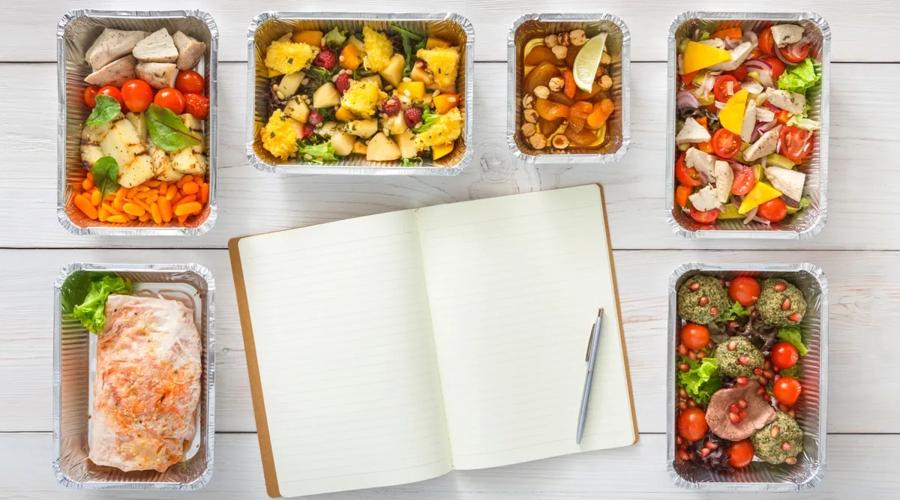Here’s an ultimate best weekly meal planner for your busy schedule:
Set aside some time to plan your meals for the week. This could be on a Sunday or any day that works for you.
Consider your schedule for the week and plan meals accordingly. If you know you have a late meeting on Tuesday, plan for a quick and easy meal that night.
Make a list of ingredients you will need for each meal and check your pantry and fridge to see what you already have. This will help you avoid unnecessary trips to the grocery store.
Choose recipes that are easy to prepare and can be made in advance. You could also consider cooking in bulk and freezing portions for later in the week.
Include a variety of protein sources, vegetables, and whole grains in your meals to ensure that you are getting a balanced diet.
Plan for leftovers and incorporate them into your meal plan. Leftovers can be a great way to save time and reduce food waste.
Don’t forget about snacks! Plan for healthy snacks to keep you fueled throughout the day.
Finally, be flexible and don’t stress if your plans don’t go exactly as planned. Life happens, and it’s okay to make adjustments to your meal plan as needed.
By following these steps, you can create a weekly meal plan that fits your busy schedule and helps you eat healthy and delicious meals throughout the week.
What Is A Weekly Meal Planner
A weekly meal planner is a tool that helps you plan and organize your meals for the upcoming week. It is a way to stay on top of your nutrition goals, save time and money, and reduce food waste. A typical weekly meal planner includes a list of meals for each day of the week, along with a corresponding grocery list that outlines the ingredients needed for each meal.
The meal planner can be customized to your dietary preferences, budget, and cooking skills. Some people use meal planner apps or printables to help them create their weekly meal plans, while others prefer to use a simple notebook or whiteboard. Regardless of the method, a weekly meal planner can be a helpful tool for anyone looking to eat healthier and more efficiently.
Why Should Use A Weekly Meal Planner
There are several benefits to using a weekly meal planner, including:
- Saves Time: Meal planning can save time in the long run. By planning out your meals in advance, you can avoid last-minute decisions and trips to the grocery store or fast-food restaurants.
- Saves Money: Meal planning can help you save money on food. When you plan out your meals in advance, you can buy ingredients in bulk or take advantage of sales at the grocery store. Additionally, you are less likely to buy unnecessary items that may go to waste.
- Reduces Food Waste: Meal planning can help reduce food waste by ensuring that you use up ingredients before they go bad. When you plan your meals in advance, you can buy only what you need and incorporate leftovers into future meals.
- Healthier Eating: Meal planning can help you eat healthier by allowing you to choose nutrient-dense foods and plan balanced meals. It can also help you avoid impulse purchases of unhealthy foods.
- Reduces Stress: Meal planning can reduce stress by eliminating the need to make decisions about what to eat each day. It can also help you feel more in control of your diet and reduce the temptation to make unhealthy choices.
Overall, using a weekly meal planner can help you save time, money, and reduce food waste while promoting healthier eating habits and reducing stress.

How Create A Weekly Meal Planner
Creating a weekly meal planner can be broken down into a few simple steps:
- Start by assessing your schedule for the week. Consider any events or activities that may impact your meals, such as work meetings, social events, or travel.
- Decide how many meals you need to plan for each day, based on your schedule and dietary needs. For example, you may plan for three meals and two snacks each day.
- Choose recipes for each meal. Look for recipes that are easy to prepare, fit your dietary needs, and use ingredients that you already have on hand. You can find recipes online, in cookbooks, or create your own.
- Create a grocery list. Once you have your meals planned, create a list of ingredients needed for each meal. Check your pantry and fridge to see what you already have on hand and only buy what you need to reduce food waste.
- Prepare and cook your meals. Plan to cook your meals in advance or consider batch cooking to save time throughout the week.
- Repeat the process each week. As you get into the habit of meal planning, it will become easier to create your weekly meal planner and adjust it based on your changing schedule or preferences.
Some people prefer to use a weekly meal planner template or app to make the process more streamlined. Whatever method you choose, the key is to be consistent and flexible with your planning to help you save time, reduce stress, and eat healthier.
What Are Some Tips For Using A Weekly Meal Planner
Here are some tips for using a weekly meal planner effectively:
Start small: If you are new to meal planning, start with planning meals for just a few days each week. This will help you get into the habit of planning and cooking meals regularly before you commit to a full week.
Plan for leftovers: Plan meals that can be easily reheated or repurposed for leftovers. This will save you time and money and reduce food waste.
Mix it up: Don’t be afraid to try new recipes and mix up your meal plan. Incorporate different types of proteins, vegetables, and grains to keep your meals interesting.
Keep it simple: Don’t try to plan elaborate meals every night. Choose recipes that are easy to prepare and fit your busy schedule.
Use what you have: Look at what you already have in your pantry and fridge and plan meals around those ingredients. This will help you save money and reduce food waste.
Prep in advance: Prep ingredients or entire meals in advance to save time during the week. You can chop vegetables, cook grains, or marinate meat ahead of time to make mealtime easier.
Stay flexible: Don’t be afraid to make changes to your meal plan as needed. If plans change or you don’t feel like cooking a particular meal, swap it out for something else on your plan.
Overall, using a weekly meal planner can help you save time, reduce stress, and eat healthier. By following these tips, you can create a meal plan that works for you and your busy schedule.
How Use A Weekly Meal Planner For Special Diets
Using a weekly meal planner for special diets requires a little extra planning and consideration. Here are some tips to help you use a weekly meal planner for special diets:
Research:
Do your research on the specific diet you are following and learn what foods are allowed and what foods to avoid. This will help you plan meals that fit within the dietary guidelines.
Seek out recipes:
Look for recipes that fit within your dietary requirements. You can find recipes online or in cookbooks specifically designed for your diet.
Create a grocery list:
Once you have your recipes, create a grocery list of the ingredients you will need. Check your pantry and fridge for any items you already have to avoid purchasing unnecessary items.
Plan for snacks:
If your special diet requires frequent snacking, be sure to plan for that in your meal planner. Consider easy-to-prepare snacks like fruits, vegetables, and nuts.
Experiment:
Don’t be afraid to experiment with different recipes and meal combinations. This can help keep your meal plan interesting and prevent boredom with your diet.
Batch cook:
Consider batch cooking to save time during the week. Prepare larger portions of meals that can be frozen or stored in the fridge for later in the week.
Stay flexible:
Be flexible with your meal plan and make adjustments as needed. If you find a recipe doesn’t work for you or if plans change, swap it out for something else on your plan.
By using these tips, you can create a weekly meal planner that fits within your special dietary needs while still providing delicious and healthy meals.

What Any Online Resources For Finding Weekly Meal Planner Ideas
There are several online resources for finding weekly meal planner ideas. Here are a few:
Pinterest: Pinterest is a great resource for finding meal planning inspiration. You can search for specific dietary needs, ingredients, or meal types to find recipes and meal planning ideas.
Allrecipes: Allrecipes offers a meal planner tool that allows you to plan meals for the week, generate a shopping list, and even adjust serving sizes.
Mealime: Mealime is a free meal planning app that offers personalized meal plans based on your dietary preferences and offers recipes and grocery lists to make meal planning easy.
Yummly: Yummly is a recipe search engine that allows you to filter recipes based on dietary restrictions, ingredients, and more. You can save recipes to a meal planner and generate a shopping list for the week.
Cooking Light: Cooking Light offers a variety of meal plans designed for specific dietary needs, including vegetarian, gluten-free, and low-carb. The meal plans come with recipes and grocery lists to make meal planning easy.
Budget Bytes: Budget Bytes offers affordable and easy-to-make recipes with a focus on cooking on a budget. The website offers a meal planning section with pre-made meal plans and shopping lists.
These are just a few online resources for finding weekly meal planner ideas. By using these resources, you can find inspiration for healthy and delicious meals that fit within your dietary needs and busy schedule.
What Are Some Mistakes To Avoid When Using A Weekly Meal Planner
Here are some common mistakes to avoid when using a weekly meal planner:
Not considering your schedule:
When creating your meal plan, be sure to consider your schedule for the week. If you know you have a busy day, plan for a quick and easy meal that night.
Not being flexible:
Life happens, and sometimes plans change. Don’t be afraid to make adjustments to your meal plan if needed.
Not planning for snacks:
Snacks can be an important part of a healthy diet. Be sure to plan for snacks throughout the day to keep you fueled and prevent overeating at meals.
Not checking your pantry and fridge:
Before creating your grocery list, be sure to check your pantry and fridge to see what ingredients you already have. This will help you avoid buying unnecessary items and reduce food waste.
Not planning for leftovers:
Leftovers can be a great way to save time and reduce food waste. Plan meals that can be easily reheated or repurposed for leftovers.
Planning too many new recipes:
While trying new recipes can be fun, planning too many new recipes can be overwhelming and time-consuming. Plan to try one or two new recipes each week and stick to familiar favorites for the rest of the week.
Not considering your budget:
When planning your meals, be sure to consider your budget. Plan meals that use affordable ingredients and look for sales at the grocery store.
By avoiding these common mistakes, you can create a meal plan that fits your schedule, dietary needs, and budget while promoting healthy eating habits and reducing food waste.
How Save Money With A Weekly Meal Planner
Using a weekly meal planner can be a great way to save money on your food expenses. Here are some tips on how to save money with a weekly meal planner:
Plan your meals around what you have: Take stock of the ingredients you already have on hand in your pantry and fridge and plan your meals around those ingredients. This will help you avoid buying unnecessary items that you already have and reduce food waste.
Buy in bulk: Buying in bulk can be a great way to save money on food items that you use frequently. Consider buying items like rice, beans, or meat in bulk and storing them in the freezer for later use.
Plan for leftovers: Plan meals that can be easily reheated or repurposed for leftovers. This will help you stretch your food budget and reduce food waste.
Shop the sales: Look for sales and specials at your local grocery store and plan your meals around those items. Be sure to check the weekly circular and use coupons for additional savings.
Stick to your list: Once you have your grocery list, stick to it. Avoid impulse purchases and stick to your meal plan to avoid buying unnecessary items.
Cook in bulk: Consider cooking meals in bulk and freezing portions for later in the week. This can help you save time and reduce food waste.
By following these tips, you can create a meal plan that fits within your budget while still providing healthy and delicious meals.

How Make Sure Weekly Meal Planner Is Healthy
Here are some tips to help you make sure your weekly meal planner is healthy:
Include a variety of food groups: Make sure your meal plan includes a variety of food groups, such as fruits, vegetables, whole grains, lean proteins, and healthy fats. This will help ensure you are getting all the nutrients your body needs.
Watch your portion sizes: Be mindful of your portion sizes when planning your meals. Overeating can lead to weight gain and other health problems.
Limit processed foods: Limit your intake of processed foods, which can be high in calories, sugar, and unhealthy fats. Opt for whole foods whenever possible.
Consider your dietary needs: If you have specific dietary needs, such as a low-sodium or low-carb diet, make sure your meal plan reflects those needs.
Use healthy cooking methods: When cooking your meals, use healthy cooking methods like grilling, baking, or roasting instead of frying.
Avoid added sugars and unhealthy fats: Read labels carefully and avoid foods that are high in added sugars and unhealthy fats.
Stay hydrated: Drink plenty of water throughout the day to stay hydrated and promote good health.
By following these tips, you can create a healthy meal plan that meets your nutritional needs and promotes good health.
How Far In Advance Plan Weekly Meals
How far in advance you plan your weekly meals will depend on your personal preference and schedule. Some people prefer to plan meals for the entire week, while others plan just a few days in advance. Here are some factors to consider when deciding how far in advance to plan your meals:
Your schedule:
Consider your schedule for the week and how much time you will have to prepare meals. If you have a busy schedule, you may want to plan meals for the entire week in advance.
Food storage:
Consider the shelf life of the ingredients you are using and how long your meals will last. This will help you determine how far in advance to plan your meals.
Freshness:
If you prefer to use fresh ingredients, you may want to plan meals just a few days in advance to ensure the ingredients stay fresh.
Meal prep:
If you plan to do meal prep in advance, you may want to plan your meals further in advance to give yourself enough time to prepare.
Dietary needs:
If you have specific dietary needs, you may need to plan your meals further in advance to ensure you have the right ingredients on hand.
Ultimately, the key is to find a planning schedule that works for you and your lifestyle. Whether you plan meals for the entire week or just a few days in advance, creating a meal plan can help you save time, reduce stress, and eat healthier.
How Make Sure Weekly Meal Planner Is Balanced
Here are some tips to help you make sure your weekly meal planner is balanced:
Include a variety of food groups: Make sure your meal plan includes a variety of food groups, such as fruits, vegetables, whole grains, lean proteins, and healthy fats. This will help ensure you are getting all the nutrients your body needs.
Use the MyPlate guidelines: Use the MyPlate guidelines as a reference to help you create balanced meals. Aim to fill half your plate with fruits and vegetables, a quarter with lean protein, and a quarter with whole grains.
Plan for snacks: Plan for healthy snacks throughout the day to keep you fueled and prevent overeating at meals.
Consider your dietary needs: If you have specific dietary needs, make sure your meal plan reflects those needs while still maintaining balance.
Watch portion sizes: Be mindful of your portion sizes when planning your meals. Overeating can lead to weight gain and other health problems.
Choose healthy cooking methods: When cooking your meals, use healthy cooking methods like grilling, baking, or roasting instead of frying.
Limit processed foods: Limit your intake of processed foods, which can be high in calories, sugar, and unhealthy fats. Opt for whole foods whenever possible.
By following these tips, you can create a balanced meal plan that meets your nutritional needs and promotes good health.

Conclusion
In conclusion, a weekly meal planner can be a valuable tool for saving time, money, reducing food waste, and promoting healthier eating habits. By taking into account your schedule, dietary needs, and budget, you can create a meal plan that fits your lifestyle while providing delicious and nutritious meals for yourself and your family. There are several online resources available to help you find meal planning inspiration and make the process easier.
To ensure that your meal plan is healthy and balanced, be sure to include a variety of food groups, watch portion sizes, and limit processed foods. With consistency and flexibility, using a weekly meal planner can help you achieve your health and nutrition goals while making mealtime easier and more enjoyable.
Can I use a weekly meal planner if I have a busy schedule?
Yes, you can use a weekly meal planner if you have a busy schedule by choosing meals that are quick and easy to prepare or by preparing meals in advance and reheating them later.
How can I involve my family in the weekly meal planning process?
You can involve your family in the weekly meal planning process by asking for their input on meal ideas, having them help with grocery shopping and meal prep, and allowing them to choose their own snacks and side dishes.
How can I stay motivated to use a weekly meal planner?
You can stay motivated to use a weekly meal planner by tracking your progress, rewarding yourself for sticking to your plan, and reminding yourself of the benefits of meal planning.
How can I adapt my weekly meal planner if my plans change?
You can adapt your weekly meal planner if your plans change by being flexible and swapping out meals or ingredients as needed.
Is it okay to deviate from my weekly meal planner?
Yes, it’s okay to deviate from your weekly meal planner if your plans change or if you’re not in the mood for a particular meal. The goal of meal planning is to reduce stress and make your life easier.




